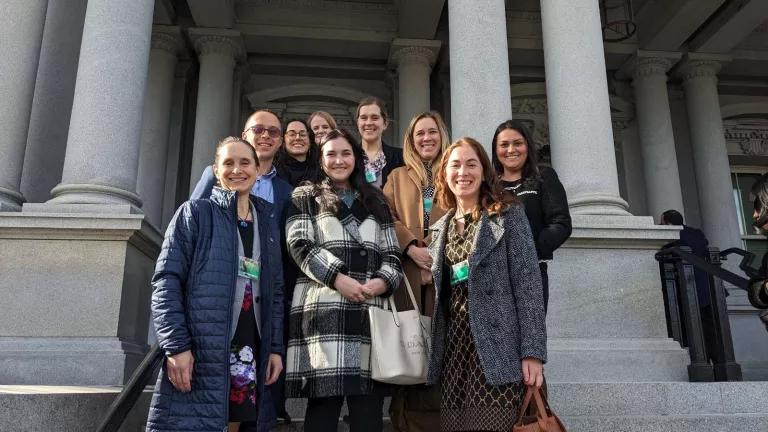Food Service Companies Must Act Following New Climate Report
A new report released by the United Nations Intergovernmental Panel on Climate Change today is the third in six months from the world’s leading experts to show that rising to the challenge of the climate crisis will require not only overhauling our energy and transportation sections—but our food supply as well.

A new report released by the United Nations Intergovernmental Panel on Climate Change today is the third in six months from the world’s leading experts to show that rising to the challenge of the climate crisis will require not only overhauling our energy and transportation sections—but our food supply as well.
Today’s IPCC report calls upon policy makers to manage land more sustainably and reduce emissions from our agricultural systems to combat climate change. Among the measures recommended to combat climate change is a shift toward plant forward diets. As the authors state: “Diversification of diets can simultaneously reduce GHG emissions and increase resilience to climate change. Consumption of healthy and sustainable diets, such as those based on coarse grains, pulses, fruits and vegetables, nuts and seeds, and animal-sourced products produced in low-energy intensive systems, presents major opportunities for reducing GHG emissions from food systems and improving health outcomes.”
This recommendation comes on the heels of two major reports by the Lancet Commissions on Climate and Obesity that also point to a reduction in the consumption of meat as a major strategy to tackle global warming.
The science is in. A cut in the consumption of climate-intensive foods like red meat can help save the planet. While even modest changes in our individual eating habits make an impact—large food service providers have the power and responsibility to make swift and sweeping progress.
That’s because food service companies—like Aramark—are among the top sellers of meals in the nation. They feed millions of people daily at large facilities like stadiums, universities and hospitals around the country. Cutting their purchases of red meat by just 30 percent would be the equivalent of taking a million cars off the roads over 10 years.
The path Aramark chooses to take with have a direct impact on their customers’ health—in both the short- and long-term. They are serving millions of college students at campuses across the country; the same students’ whose future will be determined by the actions we take (or fail to take) when it comes to acting on climate change. They’re also feeding millions of hospital patients—including those suffering from climate change-related impacts, such as heatstroke, asthma attacks and natural disasters—from wildfires to hurricanes.
At its recent annual shareholder meeting, Aramark CEO Eric Foss himself recognized the potential impact the company could have in this crisis, and gave us reasons to be hopeful the company will act when he said Aramark is “developing a holistic strategy spanning all our businesses to address climate change—from the foods we serve to the vehicles we drive. We will be setting specific goals with measurable [Key Performance Indicators] and reporting our progress publicly.”
While these are encouraging words, Aramark must follow through with action—and it must do it soon. That means making a strong commitment to reduce purchases of climate-intensive foods like red meat on its menus and add more plant-based menu items.
Lawmakers at the local, state and federal levels should also play their part by making sure public policy and incentives reflect the new climate reality and favor food purchasing that is less-climate intensive. New York City recently took a big step when it set a goal of cutting beef purchases by half by 2040. And a bill currently before the California legislature (AB 479) would provide schools with additional funding to provide climate friendly, plant-based lunch entrees and beverages. Cities and states across the country should embrace impactful measures like these. And at the federal level, the USDA’s Dietary Guidelines should reflect the scientific consensus that a diet with less meat and more plant-based foods will make both people and the planet more healthy.
And all of us can collectively have an impact through the dietary choices we make every day. By eating more fruits and vegetables—and making even modest reductions in the amount of meat and dairy we consume—we can take an even bigger bite out of climate pollution moving forward. In fact, if every American cut just one hamburger a week (which averages about a quarter pound of beef) from their diet, we could cut emissions as much as taking about 10 million cars off the road each year.
Fortunately, Americans have actually made a lot of progress in reducing the climate footprint of our diet. Changes in Americans’ diets from 2005 to 2014—particularly a 19 percent drop in beef consumption—resulted in a reduction in climate pollution equivalent to the tailpipe emissions created by 57 million cars in one year. But despite this significant reduction in beef consumption, the United States still consumes more beef and veal than most of the world. And in 2014, beef remained responsible for 34 percent of the average American’s diet-related greenhouse gas emissions.
What’s more, it’s not just the type of food we’re eating that has an impact—it’s also the amount of it that we waste. Up to 40% of food in the U.S. is never eaten—and when good food goes to waste, so does the water, pesticides, fertilizers, energy, packaging and labor it takes to get to our plates. Not only is that expensive (it costs the average family of four $1,500/year), it has enormous environmental impacts. In fact, if the food wasted around the globe were a country, it would have the 3rd highest climate footprint on the planet behind only China and the U.S.
What we eat plays a big role in the fight against climate change. Eating more plants and wasting less good food are vital places for all of us to start. Reports like the IPCC recommendations issued today provide consumers, policy-makers and the food industry with a roadmap for action. And advocates at NRDC are working at the same time to provide CEOs and policy-makers with strategies to amplify those efforts at a national level.
With strong action in homes, corporate board rooms and legislatures around the country, together we can help Americans realize the climate-fighting potential on their plates.



